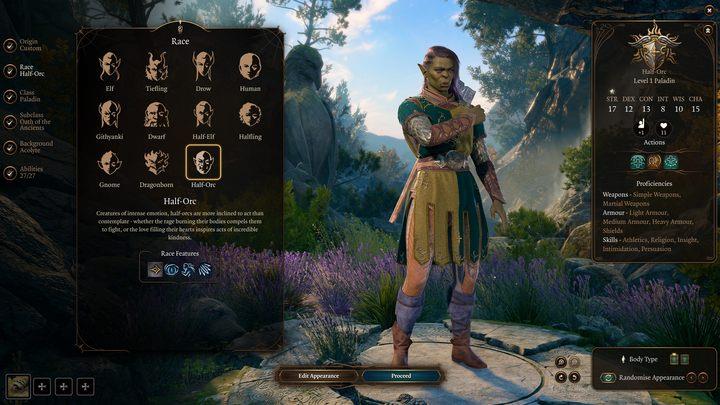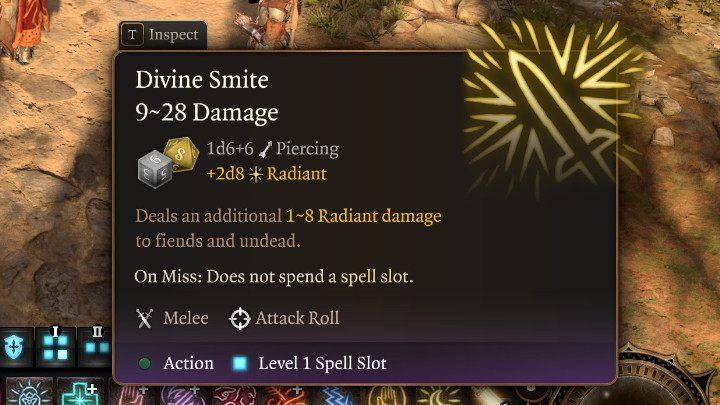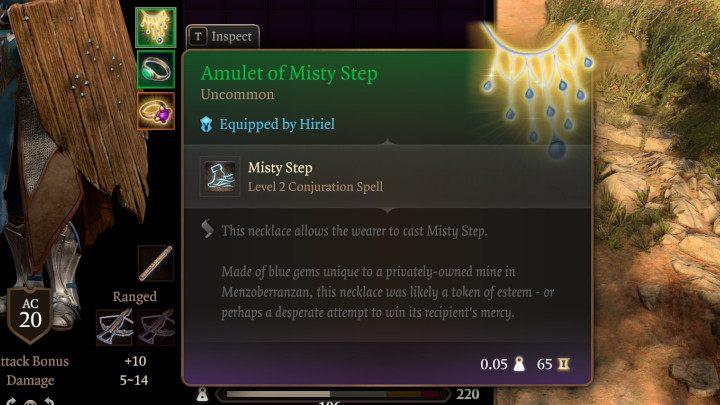In the sprawling realms of Baldur’s Gate 3, the Paladin stands as a beacon of righteousness and strength, wielding divine powers to smite foes and protect allies. With multiple subclasses to choose from, including the revered Oath of Devotion and the vengeful Oath of Vengeance, players are faced with the exhilarating challenge of crafting the ultimate Paladin build. This guide delves into the intricacies of character creation, optimal abilities, and strategic gameplay tips to ensure your Paladin not only survives but thrives in the treacherous adventures that await. Whether you seek to heal your companions or unleash devastating radiant damage, discover how to forge a Paladin that embodies your heroic vision.
You can find more basic information about the class and character creation on the page Paladin – BG3 guide. We recommend getting acquainted with this page if this is your first contact with the class or the D&D system.
Character creation wizard
Creating a character in Baldur’s Gate 3 is an engaging process that sets the foundation for your adventure. The Character Creation Wizard guides players through selecting essential attributes, including race, background, skills, and spells. For a powerful Paladin build, players should focus on maximizing Strength and Charisma to enhance combat effectiveness and spellcasting. Choosing the right race can provide bonuses that complement these attributes, while selecting a background that offers proficiency in relevant skills will enhance role-playing opportunities and interactions within the game. Understanding the intricacies of spell selection and ability scores during this phase is crucial for crafting a character that excels in both combat and narrative engagement.
As with the Warrior and Barbarian, the best class for a Paladin is Half-Orc. His abilities are perfect for a character engaged in hand-to-hand combat. Inflicting additional damage with a Critical Hit and regaining 1HP upon being knocked down are too good skills to skip.
In the case of background, it is worth considering Noble, thanks to which you will gain Proficiency in Persuasion that scales with your Charisma – one of the most vital attributes for a Paladin.
Class progression
Class progression for the Paladin in Baldur’s Gate 3 is a structured journey that enhances both combat prowess and spellcasting abilities. Starting at level 1, players focus on establishing their character’s foundation by selecting a race, background, and ability scores that emphasize Strength and Charisma, which are crucial for melee attacks and spell effectiveness. As they progress through levels, Paladins gain access to powerful features such as Divine Smite at level 2, allowing them to deal significant radiant damage. The choice of subclass—either Oath of Devotion, Oath of Vengeance, or Oath of the Ancients—further diversifies their abilities, providing unique spells and skills that enhance their role in combat. By level 5, Paladins can utilize spells like Misty Step, improving their mobility on the battlefield. Overall, the progression system allows players to tailor their Paladin’s capabilities to suit their preferred playstyle, whether it be focused on damage output, support, or crowd control.
Note! Playing as a Paladin, you must uphold your oath. Otherwise, you will lose access to the abilities resulting from it!
- At the first level, unlike some classes, Paladin instantly chooses his subclass called Oath. This guide describes the build for the Oath of Vengeance, which is the strongest one available. Additionally, a Paladin at the first level receives a healing ability called Lay on Hands. You will also receive the Divine Sense, providing an advantage on attacks against celestial, fiends, and undead as a bonus action. Inquisitor’s Might is an ability that causes a character’s weapon to deal an additional 2 points of Radiant damage.
- The second level involves choosing spells, fighting style, and the Divine Smite ability. As for the fighting style, choose Great Weapon Fighting, which provides higher damage when using two-handed weapons. In turn, Divine Smite allows you to deal additional Radiant damage if you hit an opponent in exchange for your spell slot.
- Level three gives you another spell slot for first-level spells, one additional prepared spell, a Divine Health ability that keeps your character from getting sick, and two subclass abilities – Abjure Enemy and Vow of Enmity. The first one is action allowing you to frighten the opponent. The second is a bonus action providing an advantage in the next attack.
- The fourth level is Feat and another charge of Lay on Hands. For feat, it is best to choose ability improvement, in this case, Strength.
- Level five will grant you an additional attack – an ability that will double your effectiveness in combat.
- On the sixth level, you will get Aura of Protection, which causes allies within a radius of three meters to gain a bonus equal to your Charisma modifier for Saving Throws.
- At level seven, you get the subclass feature – Relentless Avenger, which means that if you hit an opponent with an Opportunity Attack, you will receive a speed bonus of 4.5 m in the next turn.
- The eighth level is another Feat – in this case, it is recommended to take Great Weapon Master, which will allow you to deal a bonus of 10 damage in exchange for a penalty of -5 to attack roll.
- The ninth level is bonus spells.
- The tenth level provides another charge for Lay on Hands and Aura of Courage ability. It makes you and your allies immune to the effect of Frightened status.
- On the eleventh level, you receive an Improved Divine Smite, which makes your attacks deal an additional 1d8 Radiant damage.
- The last level is a Feat – you can take Tough for an extra 24 HP or Savage Attacker if you feel like you need to deal more damage.
Ilithild Powers
Ilithid Powers in Baldur’s Gate 3 offer unique enhancements that can significantly augment a Paladin’s capabilities. These powers, derived from the illithid, or mind flayer, influence gameplay by granting access to potent abilities that can complement traditional Paladin skills. For instance, Illithid Powers allow for enhanced spellcasting and combat maneuvers, such as the ability to manipulate the battlefield or bolster allies. Utilizing these powers strategically can create a versatile Paladin build that not only excels in melee combat but also provides valuable support and control in various encounters. By integrating Illithid Powers into your Paladin’s skill set, you can unlock new tactical options and elevate your gameplay experience in Baldur’s Gate 3.
Don’t be afraid to unlock and use these skills – focus especially on Cull the Weak, Repulsor and Black Hole. Unleashing the full power of Ilithild Powers doesn’t affect the character negatively, so leave all tadpoles for yourself.
Party members – their skills and spells
Party members in Baldur’s Gate 3, particularly Paladins, are equipped with a unique set of skills and spells that enhance their effectiveness in combat and support roles. Key skills for Paladins include Athletics and Intimidation, which leverage their high Strength and Charisma, respectively. These skills allow them to excel in both physical confrontations and social interactions. In terms of spells, Paladins can utilize powerful abilities such as Divine Smite, which significantly boosts their damage output by adding radiant damage to melee attacks, and Lay on Hands, a healing ability that restores hit points to allies. Additionally, spells like Shield of Faith and Bless provide crucial defensive and offensive support, making Paladins versatile party members capable of adapting to various combat scenarios while also fulfilling a protective role for their allies.
As a Paladin, you can be a one-man army, but if you want to increase your team potential, add a Rogue or a Bard to the party, thanks to which you will be able to use the skill Sleight of Hand. Additionally, Bard will provide access to unique support spells.
On the other hand, if you need more ranged damage, then a Wizard, Sorcerer, or Warlock will definitely be suitable for this task.
In the case of spells, during the game, you should focus on three of them – Hunter’s Mark, Shield of Faith, and Haste. Hunter’s Mark is a bonus action and increases the damage you deal. The Shield of Faith provides a bonus of 2 to AC, and Haste gives an additional action – however, you only unlock these at the ninth level.
Equipment and bonuses from it
In Baldur’s Gate 3, equipping the right gear is crucial for maximizing a Paladin’s effectiveness in battle. Key pieces of equipment not only enhance combat abilities but also provide unique bonuses that synergize with the Paladin’s skills. For instance, the Armour of Devotion grants access to the Eternal Devotion class action, while the Shield of Devotion increases armor class (AC) and allows for additional spellcasting capabilities. Other notable items include the Helmet of Smiting, which provides temporary hit points when using Smite spells, and the Gloves of Heroism, which grant immunity to fear and additional temporary hit points when using Channel Oath abilities. Collectively, these items empower the Paladin to serve as a resilient frontline defender while enhancing their ability to support allies through healing and buffs.
As a Paladin, you are tough and deal a lot of damage, but one of the biggest problems is the lack of mobility. Be sure to obtain the Amulet of Misty Step in the first act in the Goblin Camp.
Additionally, in the Underdark, at the Selunite Outpost, you will find the Helmet of Smiting, which means that when you apply an effect with one of your Smites, you receive bonus HP in the form of a Charisma bonus.
As for weapons, complete the first part of the quest for Karlach to defeat the false paladins. One of them will have the Sword of Justice, which grants free use of the Shield of Faith.
At the end of the game, aim for Balduran’s Giantslayer – a legendary two-handed sword that doubles the bonus from Strength to damage, and Helldusk Armor, which provides a base 21AC, the ability to fly, and resistance to fire.
Consumables
Consumables play a crucial role in enhancing the effectiveness of your Paladin build in Baldur’s Gate 3. Utilizing various potions and items can significantly bolster your combat capabilities and survivability. Key consumables include healing potions, which restore health during intense battles, and elixirs that temporarily boost your attributes or grant resistance to specific damage types. Additionally, scrolls containing spells can provide versatile options for overcoming challenges without expending your limited spell slots. By strategically using these consumables, you can maximize your Paladin’s potential on the battlefield, ensuring that you remain a formidable force against your enemies.
Below you will find a list of consumables that will make your Paladin even stronger.
- Oil of Accuracy – provides 2 to Attack Rolls.
- Elixir of Heroism – gives additional 10HP temporarily and applies “Blessed” status.
- Potion of Flying – additional mobility is something that is always needed.
- Potion of Hill Giant Strength – perfect if you don’t have 20 Strength yet.
- Elixir of Vigilance – provides 5 to Initiative, make sure to drink it before tougher battles.
What makes the Oath of Devotion subclass stand out in Baldur’s Gate 3
The Oath of Devotion subclass in Baldur’s Gate 3 stands out as the quintessential embodiment of the noble knight archetype, characterized by its unwavering commitment to honor, justice, and the protection of the innocent. This subclass is built around a core set of tenets—Courage, Compassion, and Duty—which guide its actions and decisions in the game world .
One of the key features that makes the Oath of Devotion particularly compelling is its ability to bolster both the Paladin and their allies. The Holy Rebuke ability allows a Devotion Paladin to inflict radiant damage on attackers who strike their allies, effectively turning the Paladin into a protective shield on the battlefield . Additionally, the subclass grants access to powerful healing abilities, such as Lay on Hands, which can cure diseases and restore hit points, further emphasizing its role as a guardian .
While it may lack the raw damage potential of other subclasses like Oath of Vengeance, the Oath of Devotion excels in support and utility, making it a favorite for players who enjoy a more heroic and altruistic playstyle. This balance of offensive capability and defensive support ensures that Oath of Devotion Paladins remain vital members of any adventuring party, embodying the classic role of a “knight in shining armor” .
What are the unique abilities of the Oath of Devotion subclass
The Oath of Devotion subclass in Baldur’s Gate 3 offers a range of unique abilities that emphasize healing, protection, and radiant damage, making it a quintessential choice for players who want to embody the classic role of a noble knight. Here are the standout abilities:
- Holy Rebuke (Level 1): This ability allows the Paladin to grant an ally a vengeful aura that deals 1d4 radiant damage to any enemy that hits them with a melee attack, providing both retaliation and protection in combat.
- Sacred Weapon (Level 3): By using an action, the Paladin can turn their weapon into a Sacred Weapon, adding their Charisma modifier to attack rolls and causing the weapon to emit bright light. This not only increases accuracy but also symbolizes their divine purpose.
- Turn the Unholy (Level 3): This ability forces nearby fiends and undead to flee from the Paladin, providing crowd control against these types of enemies and allowing allies to regroup or reposition strategically.
- Aura of Devotion (Level 7): This aura grants immunity to charm effects for the Paladin and nearby allies, enhancing their resilience against various magical threats on the battlefield.
- Beacon of Hope (Level 9): This powerful ability ensures that when allies are healed, they regain the maximum possible hit points. Additionally, they gain advantage on Wisdom saving throws and death saving throws, significantly improving their survivability in dire situations.
- Oath Spells: The Oath of Devotion subclass provides access to unique spells that are always prepared, including Protection from Evil and Good, Lesser Restoration, and Remove Curse, further enhancing their supportive capabilities.
These abilities collectively reinforce the Oath of Devotion’s role as a protector and healer, making it ideal for players who wish to support their party while standing firm against evil forces.


